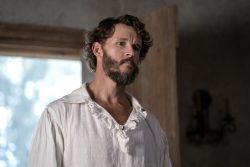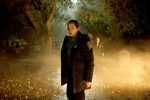“Five Pages Ahead of the Beast” Branden Jacobs-Jenkins on ‘Kindred’

“I’m pretty sure that what started me writing was reading,” said Branden Jacobs-Jenkins. “I was always bookish and I remember a day when I read something and thought, ‘I don’t think that was good’ and realized maybe I could do it better. Maybe I could tell stories?”
As a teenager, Branden wrote short stories, fiction, poetry, and everything in between. He entered some young writing workshops, then found his way to other “film nerds” who he thought were the “cool kids.” Through fiction, he started to find his voice.
These days, Branden is mainly known as a playwright, but following the success of people like Beau Willimon (House of Cards) and Elizabeth Meriwether (New Girl) he made the jump from stage to screen.
So when his agents asked if there were ever a TV show he would want to create, what might that be, Kindred was the answer. “I had reread Kindred for about the fifth time in my life and I thought that it could be a TV show.”
“It became this Moby Dick for me for like ten years while I was chasing the rights,” he said of the new series. “Finally, it all slowly came together.”

Branden Jacobs-Jenkins. Photo courtesy of FX
Finding Your Voice
“I don’t know if I believe that you can hear your own voice as a writer. I think you write how you write and people reflect it back to you. Early on, I think certain obsessions or themes began to announce themselves to me,” said Branden whose list includes “family drama, family relationships, themes of history that haunts us, complicated moral situations.”
“So I feel like if I had to pitch myself, I would say radical adaptations of contemporary social norms with a historical element or intercultural entanglements. But you ultimately just make the thing you want to see. I like a certain palette of emotions and some discomfort, so I like stories that pack in a wide range of feelings.”
All of these creative pursuits helped Branden with his plays and now screenplays. “There’s a ton of craft that goes into playwriting. You are building this thing that has to happen perfectly in a certain span of time and you are using a different form of your brain to see where you can press in and press out, and doing all of these things within the laws of physics because you can’t go bird’s eye view and you have to be sensitive of your actors, when someone has to pee, but also to inspire them,” he joked.
This leads to some natural creative constraints, be it conscious or subconscious. “Sometimes, people say my episodes feel like a play,” he added. “That might just be because of my instincts. I love to live in moments and I like when things feel real. I also go quite deep into character motivation. When you’re asking the actors to feel real, they need something real to work with. I can get fine-detailed thinking about the emotional reality.”
Branden also doesn’t like to cheat time. “Suspense comes from pressing time in a story. I’ve yet to write an episode that covers multiple years in an episode, which isn’t to say that I won’t but I like to get actors to do something surprising on camera. If anything, that’s what my playwriting encourages.”
From Plays to Television
“I guess, with a play, you can tell the actor to try it differently tomorrow, but in this form, it’s frozen in time,” said the screenwriter. “With a play, you have six weeks of rehearsal, so it feels rushed because you’re holding the whole event in your head. It’s crazy doing a TV show where you get through five pages in a day and that’s it. You always feel like you’re being pursued by a monster and you’re just trying to stay five pages ahead of the beast.”
Branden said beyond the monster, he didn’t really have any other misconceptions of being a showrunner. “I had been warned enough,” he said. “It’s time management, patience, and you have to like to pivot. You have to like to find the new idea when you need to find it. That’s something I really enjoy the most: solving problems and doing puzzles. Showrunning is one escape room after another.”
He also said it’s a “humbling shock” when something is picked up after spending so much time on it alone, at your laptop. “Suddenly, you have five hundred people around you who are willing to put this thing into the world. Ten times the people of a play and budgets are hundreds times. You write, ‘someone sits next to a house’ and then someone actually builds a house – it’s crazy.”
“The guiding light in my mind, creatively, is to do the things I want to see. That’s sort of the buffer when it comes to things getting made or not getting made. I read [Kindred] and knew I wanted to see it and knew it could be a TV. It’s all about time and the more time you spend with people, the more you get to know them.” Before this, people had tried to adapt Kindred as a movie, but Branden said this didn’t work simply because they needed time to make it work. It needed the full arc of a series, or mini series in this case.
Overcoming Development Hell
The screenwriter was in development hell for about five years, where he wrote five drafts, until the network finally came onboard. Logistically, he had a mini writers’ room before the pilot was shot. “In a writers’ room, you’re trying to prove that the idea has legs. We broke out ten episodes, then they decided they wanted eight episodes, so we spent about sixteen weeks with the writers.”
“We had some writers on set, in and out, which helped because you’re constantly responding to what’s happening or what’s not happening on set. I think it was pretty traditional.” The show eventually ended up on FX / Hulu, where it fits alongside other minority-focused stories such as Atlanta, Reservation Dogs, What We Do in the Shadows, Pose, and some seasons of the anthology series, Fargo.
“I don’t think anybody knew where this was going when we sold the show in 2016. I think they’re responding to the data of who is watching what. With streaming, you can really pay attention to who is watching your shows and what they value. I think that’s the model that everyone is leaning towards. I wish there was a state of the union about content creators of color, but that has not happened.”

Thomas Weylin (Ryan Kwanten) Photo by Ryan Kwanten
Within this new model, it’s also somewhat less important what genre a show like this might be. The author, Octavia E. Butler, doesn’t think of it as science fiction even though it’s often labeled as such. “She calls it fantasy, but people hear fantasy and think Game of Thrones. At the same time, it’s this classic novel that’s taught in universities, so it’s caught between a few worlds. We don’t put it in a bucket. We just let it be what it is. It’s a character based drama with a spooky element to it.”
Advice for Writers
Branden said he’s not sure if television writing will change the way he writes plays going forward, but he does feel more of a “lack of preciousness.” He said, “Television and film really reward literal writing. It has to be a good read but also translate to what people need to do. You want to impress executives with your gift of language, but those things get in the way when a seamstress needs to know what color this dress is,” he continued. “Hopefully, I’m a more efficient writer now.”
He continued, “It also reaffirmed that story is everything. Stories are what the human mind craves. I think this experience only made me want to double down on that belief.” As for some more logistics, Branden said he didn’t understand outlines earlier in his career, but he now knows that’s where you “work out the math” of the story. “Back then, finishing a script was torture, but script writing is more pleasurable when you outline. That’s something I’ve gotten over in terms of being resistant to.”
“Then, character is everything. You’re not going to think your way into the story. You have to build characters who take you through the story because they have specific needs and desires that they’re working through. It took me a long time to crack these characters. I thought the book would do that for me, but a book is a book and a screenplay is a screenplay. Once you really understand that, adaptations are much easier.”
As for getting noticed today, Branden said, “there’s a funny desire to brand yourself early before you know what you want to do. There are a lot of people who think they want to be writers but they don’t like writing. Those people have very short careers. What’s going to get you noticed is the work and the only way to get the work done is to like doing the work.”
Branden concluded, “Write what you like and what’s interesting to you. Once writing doesn’t make you anxious, it’s easier to get noticed because you have the receipt to prove it. You don’t need permission or encouragement, you just like to write and you have something to offer. Then you’re unstoppable. Don’t pitch yourself, let the work pitch you.”
This interview has been condensed. Listen to the full audio version here.
Join the Discussion!
Related Articles
Browse our Videos for Sale
[woocommerce_products_carousel_all_in_one template="compact.css" all_items="88" show_only="id" products="" ordering="random" categories="115" tags="" show_title="false" show_description="false" allow_shortcodes="false" show_price="false" show_category="false" show_tags="false" show_add_to_cart_button="false" show_more_button="false" show_more_items_button="false" show_featured_image="true" image_source="thumbnail" image_height="100" image_width="100" items_to_show_mobiles="3" items_to_show_tablets="6" items_to_show="6" slide_by="1" margin="0" loop="true" stop_on_hover="true" auto_play="true" auto_play_timeout="1200" auto_play_speed="1600" nav="false" nav_speed="800" dots="false" dots_speed="800" lazy_load="false" mouse_drag="true" mouse_wheel="true" touch_drag="true" easing="linear" auto_height="true"]










You must be logged in to post a comment Login